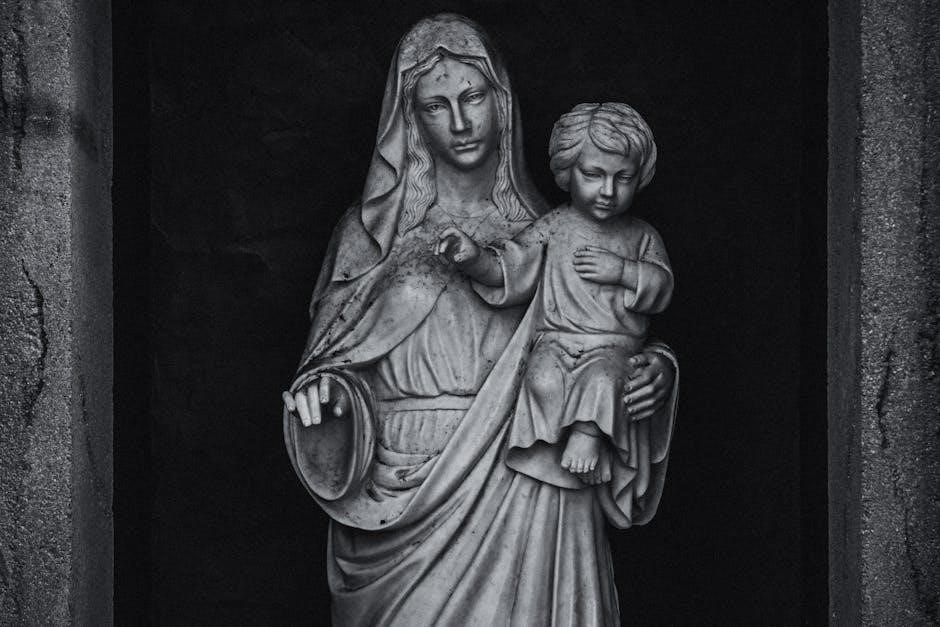This controversial adult coloring book blends humor with sharp social commentary, targeting homophobia and sparking intense debates. Its bold approach has drawn both criticism and praise, becoming a cultural lightning rod in Spain and beyond.
Overview of the Book’s Title and Initial Reception
El Niño Jesús No Odia a los Mariquitas (The Child Jesus Doesn’t Hate Gays) is a provocative and unconventional adult coloring book that combines humor with bold social commentary. Its title, translating to “The Child Jesus Doesn’t Hate Gays,” immediately sparked controversy due to its blending of religious imagery and LGBTQ+ themes. Upon its release, the book garnered significant attention for its unapologetic critique of homophobia and its unique approach to addressing societal issues through art and satire. While some praised its progressive message and creative format, others, particularly conservative groups in Spain, expressed outrage, accusing it of blasphemy and disrespect. The book’s initial reception was polarizing, reflecting the broader cultural tensions it aimed to address. Its availability as a downloadable PDF further amplified its reach, making it accessible to a global audience and fueling both admiration and backlash. The book quickly became a symbol of resistance and a catalyst for conversations about tolerance and acceptance.

Background and Purpose of the Book
El Niño Jesús No Odia a los Mariquitas was created to challenge societal norms and promote acceptance through humor and art. Its purpose is to critique homophobia while offering an engaging, adult-oriented coloring experience.
The Book’s Structure and Intent Behind Its Creation
El Niño Jesús No Odia a los Mariquitas is structured as a hybrid of a coloring book and a satirical commentary on societal issues. Its intent is to challenge homophobic attitudes through humor and art, blending irreverent illustrations with thought-provoking themes. The book targets adult audiences, offering a unique way to engage with sensitive topics while encouraging reflection and dialogue. By combining lighthearted visuals with sharp critiques, the creators aim to dismantle stereotypes and promote acceptance. The book’s design reflects its dual purpose: entertainment and activism, making it accessible while sparking meaningful conversations. This approach has resonated with progressive audiences, though it has also faced backlash from conservative groups. The book’s structure and intent highlight its role as both a cultural artifact and a tool for social change, aiming to bridge the gap between art and activism in a bold and unconventional way.
How the Book Combines Humor and Social Commentary
El Niño Jesús No Odia a los Mariquitas masterfully blends humor with biting social commentary, using satire to critique homophobia and societal prejudice. The book’s irreverent tone and playful illustrations create a lighthearted yet provocative narrative that challenges readers to confront uncomfortable truths. By juxtaposing religious imagery with LGBTQ+ themes, the book mocks stereotypes while promoting acceptance. Its humor acts as a vehicle for deeper reflection, making complex issues more accessible. The coloring book format allows readers to engage physically, reinforcing the message through creative interaction. This unique approach fosters a space where laughter and introspection coexist, encouraging dialogue and personal growth. The book’s ability to entertain while provoking thought has made it a powerful tool for addressing homophobia, proving that humor can be both a shield and a sword in the fight for social change.

The Controversy Surrounding the Book
El Niño Jesús No Odia a los Mariquitas has sparked significant controversy, particularly in Spain, where conservative groups have criticized its provocative blend of religious imagery and LGBTQ+ themes, leading to heated public debates.
Backlash from Conservative Groups in Spain
Conservative groups in Spain have vehemently criticized El Niño Jesús No Odia a los Mariquitas, accusing it of blasphemy and offending religious sensibilities. The book’s use of religious imagery intertwined with LGBTQ+ themes has sparked outrage, with some labeling it an attack on traditional values. Critics argue that the blending of humor and social commentary crosses a line, particularly in a country where religion and culture remain deeply intertwined. Several conservative organizations have called for the book to be banned, claiming it disrespects religious symbols and promotes immorality. Legal challenges have also been attempted, though none have succeeded in halting its distribution. The backlash highlights the polarizing nature of the book, which has become a focal point in debates over free expression, religious freedom, and social progress in Spain.
Support and Praise from Progressive Audiences
Progressive audiences have embraced El Niño Jesús No Odia a los Mariquitas as a bold and necessary commentary on homophobia and societal norms. The book’s unique blend of humor and activism has resonated deeply with liberals and LGBTQ+ allies, who view it as a powerful tool for challenging prejudice. Many praise its ability to address serious issues through an unconventional medium, making it accessible and engaging for a wider audience. Supporters argue that the book’s irreverent style is a refreshing way to spark conversations about acceptance and inclusivity. The artwork and satirical tone have been particularly commended for their creativity and effectiveness in highlighting the absurdity of homophobia. For many, the book represents a cultural shift, encouraging dialogue and fostering empathy. Its cross-cultural relevance has also drawn international attention, solidifying its place as a significant work in contemporary social commentary. The PDF version’s accessibility has further amplified its impact, allowing it to reach readers globally and inspire change.

Cultural and Social Impact
El Niño Jesús No Odia a los Mariquitas has sparked vital conversations about homophobia, challenging societal norms through its provocative humor and art. Its cross-cultural relevance has made it a global symbol of resistance and change.
Role in Sparking Conversations About Homophobia
El Niño Jesús No Odia a los Mariquitas has emerged as a bold catalyst for discussions on homophobia, using its provocative humor and vivid imagery to challenge societal norms. By blending satire with religious and LGBTQ+ themes, the book forces readers to confront their biases and question traditional views. Its controversial approach has ignited debates across Spain, particularly among conservative groups who view it as offensive, while progressive audiences praise its fearless critique of homophobia. The book’s ability to merge art and activism has made it a powerful tool for sparking conversations, encouraging people to reflect on their attitudes toward the LGBTQ+ community. Its impact extends beyond entertainment, fostering dialogue and raising awareness about the importance of acceptance and inclusivity in a society often divided by prejudice. This unique blend of humor and social commentary has solidified its role as a cultural provocateur, pushing boundaries and challenging the status quo.
Reception Beyond Spain and Cross-Cultural Relevance
El Niño Jesús No Odia a los Mariquitas has transcended Spanish borders, capturing international attention for its bold critique of homophobia and religion. The book’s controversial nature has resonated with global audiences, particularly in regions grappling with similar issues of LGBTQ+ rights and religious conservatism. Its unique blend of humor, art, and activism has made it a subject of discourse in diverse cultural contexts, from Latin America to Europe and beyond. The PDF version’s accessibility online has further amplified its reach, allowing readers worldwide to engage with its provocative content. While some cultures have embraced its message of inclusivity and satire, others have met it with resistance, highlighting the universal relevance of its themes. This cross-cultural resonance underscores the book’s ability to spark important conversations about identity, religion, and societal norms, making it a significant work in contemporary discussions of social justice and human rights.

Availability and Access
The PDF version of El Niño Jesús No Odia a los Mariquitas is readily available online, accessible through various platforms and websites. It can be downloaded for free, making it widely accessible to global audiences.
How to Find and Download the PDF Version
Finding and downloading the PDF version of El Niño Jesús No Odia a los Mariquitas is straightforward. Start by searching online using keywords like “El Niño Jesús No Odia a los Mariquitas PDF” or “El Niño Jesús No Odia a los Mariquitas descargar gratis.” Use popular search engines or platforms like Google, Bing, or even academic databases. Additionally, websites offering free eBooks or PDF downloads often host this title. Once you locate a reliable source, verify the authenticity of the file to ensure it is safe and free from malware. Click on the download link provided, and the PDF will be saved to your device. This method allows readers worldwide to access the book effortlessly, contributing to its widespread availability and cultural impact. The simplicity of digital access has made this provocative work reachable to a global audience, fostering its reputation as a significant and controversial publication.
